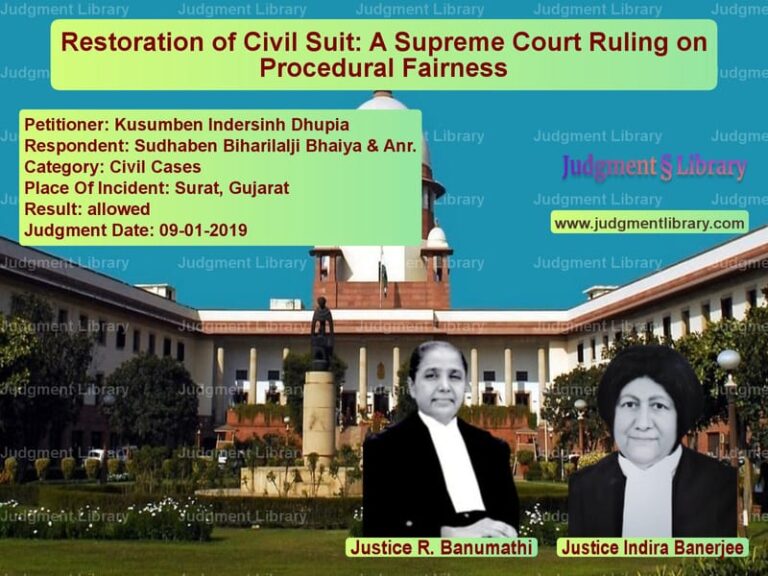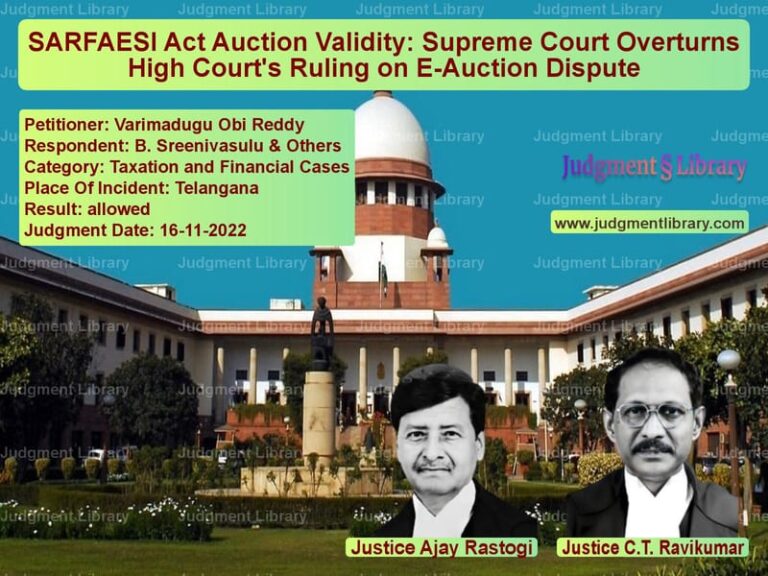Supreme Court Upholds Employee Dismissal Despite Pending Criminal Case
The legal dispute in Eastern Coalfields Limited & Ors. vs. Rabindra Kumar Bharti revolved around the termination of a government employee accused of corruption. The Supreme Court had to decide whether the High Court was justified in staying the employee’s dismissal while a criminal case was pending.
Background of the Case
The respondent, Rabindra Kumar Bharti, was a clerk at Eastern Coalfields Limited. A complaint was lodged against him for demanding a bribe to process retirement formalities. The Central Bureau of Investigation (CBI) arrested him on August 31, 2015, and he was charged under the Prevention of Corruption Act, 1988.
Following his arrest:
- He was suspended on August 3, 2015, but reinstated on September 15, 2015.
- On March 20, 2017, the company initiated a departmental inquiry.
- During the inquiry, he filed a writ petition challenging the disciplinary proceedings.
- The Single Judge of the High Court allowed the inquiry but prohibited any final decision without court approval.
The departmental proceedings concluded, and Eastern Coalfields Limited sought permission to dismiss him. On March 2, 2021, the company dismissed him from service. However, the Division Bench of the High Court stayed his dismissal until the conclusion of the criminal trial, stating that the dismissal would only take effect if he was convicted.
Petitioners’ Arguments
Senior Advocate Shri Vishwajit Singh, representing Eastern Coalfields Limited, argued:
“There is no legal requirement to delay disciplinary action until the conclusion of a criminal trial. A departmental inquiry operates independently, and its purpose is to maintain administrative discipline, not to determine criminal guilt.”
He further emphasized:
- The departmental proceedings were lawfully conducted, and the respondent participated.
- The Prevention of Corruption Act was separate from service rules governing misconduct.
- The High Court erred by staying dismissal merely because the criminal trial was ongoing.
Respondents’ Arguments
On the other hand, Senior Advocate Mr. Mahesh Prasad, representing the employee, contended:
“The departmental proceedings were conducted unfairly, and the charges in the criminal case and the departmental inquiry were identical. If the criminal court finds him not guilty, his dismissal should not stand.”
He also argued that:
- The same witnesses and evidence were used in both proceedings.
- Following the precedent in Capt. M. Paul Anthony vs. Bharat Gold Mines Ltd., departmental proceedings should be stayed when criminal charges involve serious allegations.
- If the employee was later acquitted, his dismissal would be unjustified.
Supreme Court’s Observations
The Supreme Court bench, comprising K.M. Joseph and Hrishikesh Roy, overturned the High Court’s decision. The Court reaffirmed the distinction between criminal trials and departmental inquiries, stating:
“Criminal trials and disciplinary proceedings serve different purposes. A criminal trial determines guilt beyond reasonable doubt, while a departmental inquiry ensures administrative integrity based on preponderance of probability.”
The Court emphasized:
- Departmental proceedings should not be delayed merely because a criminal case is pending.
- Acquittal in a criminal trial does not automatically invalidate disciplinary action.
- The High Court exceeded its jurisdiction by keeping the dismissal in abeyance.
Final Judgment
The Supreme Court allowed the appeal and set aside the High Court’s order. It ruled that:
- The dismissal of the employee stands.
- The employee can challenge the departmental proceedings through proper channels.
- The High Court erred in invoking Order 41 Rule 33 of the Civil Procedure Code to stay the dismissal.
Conclusion
This judgment reinforces the principle that departmental inquiries are independent of criminal proceedings. Employers retain the right to take disciplinary action without waiting for criminal trials to conclude. The ruling ensures that government organizations can maintain administrative discipline without undue interference from the courts.
Petitioner Name: Eastern Coalfields Limited & Ors..Respondent Name: Rabindra Kumar Bharti.Judgment By: Justice K.M. Joseph, Justice Hrishikesh Roy.Place Of Incident: India.Judgment Date: 07-04-2022.
Don’t miss out on the full details! Download the complete judgment in PDF format below and gain valuable insights instantly!
Download Judgment: eastern-coalfields-l-vs-rabindra-kumar-bhart-supreme-court-of-india-judgment-dated-07-04-2022.pdf
Directly Download Judgment: Directly download this Judgment
See all petitions in Disciplinary Proceedings
See all petitions in Termination Cases
See all petitions in Public Sector Employees
See all petitions in Judgment by K.M. Joseph
See all petitions in Judgment by Hrishikesh Roy
See all petitions in allowed
See all petitions in Quashed
See all petitions in supreme court of India judgments April 2022
See all petitions in 2022 judgments
See all posts in Service Matters Category
See all allowed petitions in Service Matters Category
See all Dismissed petitions in Service Matters Category
See all partially allowed petitions in Service Matters Category







